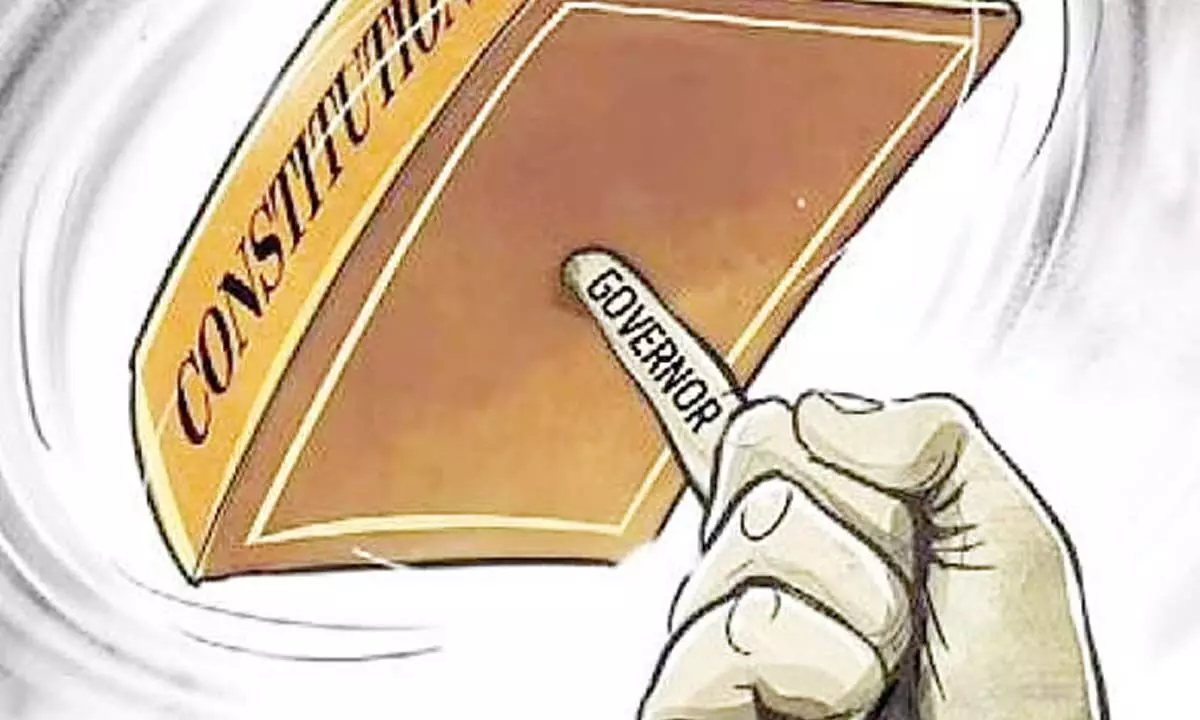Governors and Governance: Look beyond political rehabilitation
A true statesman secures democracy, much beyond his own political party
image for illustrative purpose

"In a democracy, everyone has a right to speak. In a democracy, grass has a right to grow and a donkey has a right to eat." - Supreme Court in Nupur Sharma case
Much before the Double Engine doctrine propagated by the current dispensation at the Centre, it was Indira Gandhi who had started using Governors as tools of the ruling party to eliminate opposition. The way the then Andhra Pradesh Governor Ram Lal dismissed NTR Government in a highly questionable, anti-democratic manner, ironically on August 15, 1984, is still fresh in our memory. NTR had to be reinstated after he paraded his 161 MLAs in front of the then President Giani Zail Singh.
Indira regime also saw dismissal of several State governments. Governor Ram Lal was made the scapegoat in the process. India Today wrote then: "Democracy could not have been betrayed in a more sordid manner. Beginning with the dismissal of the majority ministry in the tiny Himalayan state of Sikkim, followed by a carefully engineered toppling game in Jammu & Kashmir and now in Andhra Pradesh, the ruling party appeared to have perfected a technique of snuffing out opposition-led ministries."
And now, we see a virtual replay of that anti-democratic system, shockingly though, by those who claim to uphold democracy. State after State, the BJP has been bulldozing its way to crush the Congress governments and the latest was Maharashtra.
BJP denials notwithstanding, the Shiv Sena (led by Uddhav Thackeray), the NCP and the Congress say that it was the Lotus party that engineered the toppling of the tri-party Maha Vikas Aghadi (MVA) government. The manner in which the rebel Shiv Senas led by Eknath Shinde were given shelter in BJP ruled Gujarat, Assam and then Goa clearly shows the Central leadership's patronage, MVA said.
What is more, Shinde was made to midnight air dashes to Delhi-Surat and back to Guwahati ostensibly to see Ami Shah first and Devendra Fadnavis later. Maharashtra Governor, Bhagat Singh Koshyari, an RSS veteran, and then CM Uddhav Thackeray did not exactly enjoy a cordial relationship. In a shocking letter to Thackeray, Koshyari had questioned the then CM for allowing the reopening of bars and restaurants when 'our gods and goddesses have been condemned to stay under lockdown'.
Koshyari asked Thackeray if he turned secular and forgot Hinduism. Thackeray shot back saying he did not require a certificate on Hinduism from Koshyari. Moreover, the Governor is also bound by secularism as enshrined in the Constitution. This case is enough to showcase the bitterness between the two though it is just a tip of iceberg as there have been many more such incidents in the past.
The Maharashtra Governor delayed his green signal for the election of the Speaker to the Legislative Assembly, after the resignation of Congress MLA Nana Patole who was made the party's state unit head. Koshyari, who had earlier cited a pending court case not to hold the Speaker election, ordered it when Eknath Shinde was asked to go for a floor test.
The MVA understandably questioned this. So, it is clear that the party in power at the Centre and a majority of States – be it the Congress of the 1980s or the BJP of this decade –want to have their way. In such a scenario, why do we need to have Governors? It is time we debated the importance – or lack of it – attached to the position of Governors. Often, the Centre appoints Governors either to rehabilitate the ruling party leaders or to suit Delhi's political interest. There is no harm in having governors to act as checks and balances of democracy. But the problem arises when the system is used and misused to tilt balances towards majoritarianism. Those who keep criticising Indira Gandhi sadly keep perpetuating her policies may be in a different way. But the end result is the same: My way or no way! In this context, I think Lok Satta founder and former IAS officer Jayaprakash Narayan has a solid point. He calls for an elected system of Governors. If the direct election is not acceptable, he says the State Legislatures and the local self-government bodies could elect the Governor. This could be on the lines of the system to elect the President of India.
Both the Houses of Parliament and the State Legislatures vote to elect the President. What an idea Jayaprakash Ji! With his years of experience in the administration and after seeing the roles played by various political-appointee governors, he has come out with an idea worth considering. Remember, Jaya Prakash is a man behind many reforms. Let me go one step further, while having the system to elect Governors, we must have the system to recall them by the same electoral colleges. This will ensure that the elected Governor functions in the interest of the entire State, and not just as an emissary of a political party.
Returning to the opening quote from the recent Supreme Court proceedings, every elected government has the right to function till they enjoy the people's mandate. We are bound by the Constitution, the Preamble of which begins with "We the people." Let the people decide what is good for them and what is not. Political pulls and pressures should not decide the existence, let alone functioning, of the State Governments. A true statesman secures democracy, much beyond his own political party. This is not a tall order that one expects in this Amrit Mahotsav year.
(The columnist is a Mumbai-based media veteran now running websites and a youtube channel known for his thought-provoking messaging.)

